How to Clean Cloth Diapers
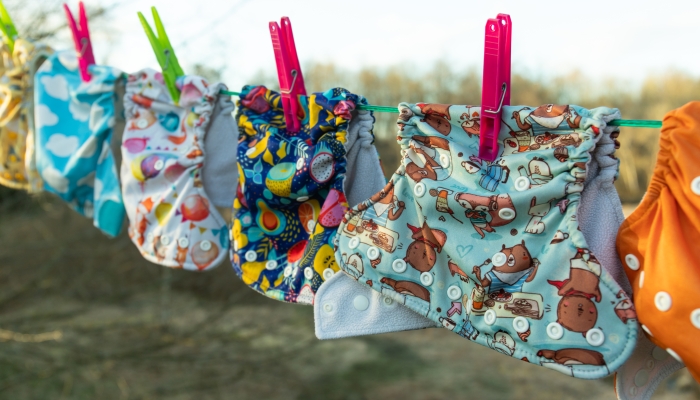
- Parents should use a fragrance-free detergent that doesn’t leave any residue on the diapers.
- Diaper sprayers attach to your toilet and can be used to spray waste directly into the toilet bowl.
- As a safe alternative to bleach, lemon juice will help whiten your diapers.
Many parents turn to cloth diapers as an alternative to disposable diapers. There’s a good reason for this switch. In a product-specific data report for nondurable goods, the EPA estimates that 3.3 million tons of disposable diapers were dumped in landfills in 2018.
On top of wanting to save landfills of non-biodegradable, soiled diapers, many parents like the health benefits of these nontoxic diapers. Our first child had very sensitive skin, and we were constantly testing out diapers for sensitive skin to try and eliminate diaper rashes. Using cloth diapers was a highly recommended option by our pediatrician.
Whatever the reason for a parent’s choice to use cloth diapers, it’s important to know how to properly clean them. Cloth diapers cannot be washed the same as most laundry. You won’t be able to simply toss them in the wash along with your towels and rags.
Though the process can seem daunting, it’s not complicated once you get the basic steps down. If you’re starting your cloth diapering journey and looking for a cleaning guide, this is for you. Follow these simple tips on how to clean cloth diapers to make cleaning a breeze.
Essential Things for Cleaning Cloth Diapers
Let’s start with the essentials you must know when cleaning cloth diapers. Again, you won’t be able to wash these diapers as you do regular laundry. The detergent and method you use will likely look different for washing cloth diapers.
Before you start cloth diapering, be sure you have the right products. Here’s what we recommend:
Scent-Free Detergent
Scented detergent can easily irritate your baby’s skin. When washing cloth diapers, detergent residue might stay on the cloth. Since many parents turn to cloth diapering to avoid irritants, using scent-free detergent is a must.
You’ll also want to use a laundry detergent that rinses out well. Some popular picks are Tide Free and Gentle or Purex Free and Clear. Eco-friendly detergents like Seventh Generation or Biokleen are also excellent choices.
Diaper Sprayer
To wash dirty diapers effectively, you’ll need to rinse the poop. This is not a fun task. Having a diaper sprayer on hand will make the job much easier.
Diaper sprayers attach to your toilet and can be used to spray feces directly into the toilet bowl. You can use a spray bottle if you don’t want to invest in a diaper sprayer.
Lemon Juice
As a safe alternative to bleach, lemon juice will help whiten your diapers. You can add ½ cup of lemon juice to the wash to boost the detergent’s cleaning power. This will also help your diapers smell fresh.
What products should you not use to clean cloth diapers?
Bleach should be used sparingly, if ever, on cloth diapers. Chlorine bleach will break down the natural fibers of the diaper and cause it to wear down quickly. If you must use bleach, only use ¼ cup in a regular load once a month.
Steer clear of all detergents that might cause a diaper rash on your child’s skin. Also, fabric softeners should never be used as they will cause a build-up on the diapers. When your diapers are coated with fabric softener, dryer sheet chemicals, or detergent the absorbency will decline and diaper blowouts will increase.
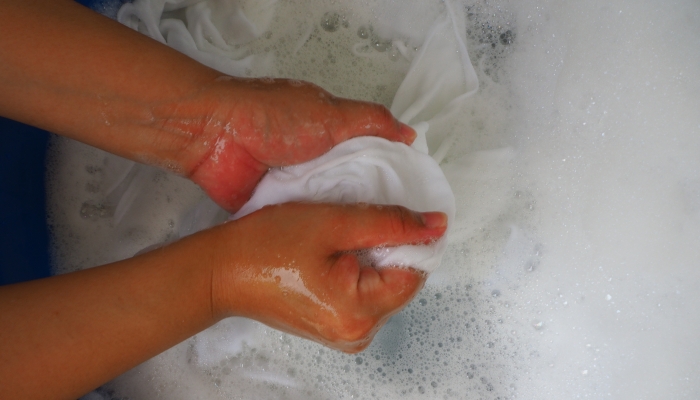
How Do You Clean Poop Out of Cloth Diapers?
To clean poop out of cloth diapers, you’ll need some type of spraying device. This can be a diaper sprayer, spray bottle, or spray nozzle on a sink. Just expect to need to sanitize any sink you use after you’re finished.
Breastfed babies’ poop is water soluble and doesn’t require much more than a quick spray. If your child is eating solid food or drinking formula, the solid waste will need to be emptied into the toilet first. Then you can use a sprayer to remove any extra residue.
Spraying soiled cloth diapers before putting them into the washing machine helps reduce stains. You’ll want to leave the diapers soaking wet when you put them into the diaper pail. This keeps the stains from drying and setting.
How to Wash Cloth Diapers
Some websites will provide elaborate instructions for washing cloth diapers. We’ve found there are only a few key steps you’ll need to take to wash soiled cloth diapers.
Spray
If you’re washing dirty, soiled diapers, you’ll want to pre-rinse them with a diaper sprayer. This will keep you from having to clean poop out of your washing machine.
Pre-Rinse
Next, load the diapers into the washing machine, washing no more than 12-18 diapers in one load. Select pre-rinse or pre-wash on your machine and run them with cold water and no detergent. This step will help remove stains and prep the diapers for deeper cleaning.
Wash
Once the dirty cloth diapers have been rinsed, you’ll want to wash them in warm water in a regular wash setting. Be sure to use a fragrance-free detergent that doesn’t leave any residue on the diapers.
Additionally, you can add an extra rinse cycle to the end to ensure leftover detergent doesn’t build up on the diapers.
Do you have to wash cloth diapers after every use?
You do not need to wash cloth diapers after every use. This would be exhausting to keep up with and would waste a lot of energy. Instead, try washing a load every 1-2 days.
Don’t go more than 2 days without washing a load. Doing so will allow mildew to grow, causing a bigger cleaning job for you. You’ll also end up with quite a stench in your laundry room.
What if the diaper starts to stink even after a wash?
Stinky diapers after a wash might mean you need to strip the diapers of any bacteria, minerals, or detergent buildup. Washing the diapers in hard water or using too much detergent could be the cause of smelly diapers.
You’ll be pleased to know the solution is simple. To strip your smelly diapers of all build-up, try one of these options:
- Fill the washer with very hot water and add 1 tablespoon of dawn dish soap to the water. Add diapers and allow to soak overnight.
- Run a load of diapers on a heavy wash setting with store-bought stripping detergent.
- Use a homemade recipe for diaper stripping using 3 tablespoons each of Borax, Calgon, and washing soda. Soak diapers in the solution with water overnight and wash in a hot wash cycle.
To avoid build-up and keep your cloth diapers fresh, you can also add ½ cup of baking soda and ½ cup of vinegar to your regular wash routine for cloth diapers.
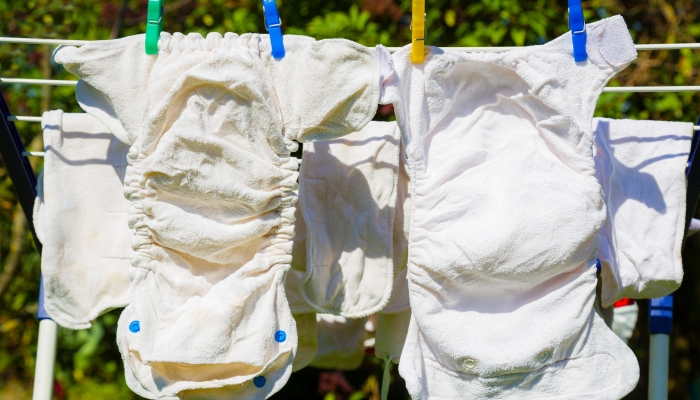
How to Dry Cloth Diapers
When it comes to drying cloth diapers, you have two options: machine dry them or hang them to dry on a line. Here are the pros and cons of either method:
Machine Drying:
- Faster
- Less cost-effective
- Wears down diapers quickly
Air Drying:
- More cost-effective
- Won’t wear down cloth diapers
- Requires more space and time
If you decide to dry the wet diapers in the dryer, just be prepared that they will need to be replaced sooner than if you line dry. If space and time are an issue, you might not mind this drawback. Also, using a medium to low setting will help extend the life of the diapers.
If you decide to line dry the wet diapers, be sure to hang the diapers so the elastic sides aren’t being stretched out. Skipping this step will put stress on the elastic and cause it to wear down quickly.
Cloth diaper liners, inserts, or flats can all be dried on higher heat settings.
Additional Cloth Diaper Care Tips
When the diapers are either waiting to be washed or waiting to be folded, you’ll want to know how to store them. Here are some helpful hints to make cloth diapering easier:
Where do I keep the diapers until the next wash?
We recommend purchasing a diaper pail or wet bag, and storing soiled or wet diapers in there until you’re ready to wash cloth diapers again.
Not just any diaper pail will work for a cloth diaper. The best diaper pails for this use will have large openings and won’t individually seal in every diaper.
The Diaper Genie pail is an example of a pail that won’t work well. The bag seals in each cloth diaper and can cause mildew and bacteria to build up. Look for Diaper Genie alternatives that feature suitable designs for a cloth diaper routine.
How should clean cloth diapers be stored?
When diapers are ready to be put away, you’ll want to store them in a convenient place. Some parents like to use plastic drawer carts to separate the liners, pre-folds, snap diapers, and other cloth diaper items.
To make your cloth diapers easy to grab and go, we recommend placing the cloth inserts inside the cloth diaper. This will allow you to stick a few in your diaper bag on the way out the door.
FAQs
Why use cloth diapers?
If you’re on the fence about cloth diapering, you might ask, “Are cloth diapers worth it?” Who wants to spend time spraying off soiled diapers and washing loads of laundry?
You’ll find there are several pros and cons to cloth diapering. These might help you decide whether or not you want to use cloth diapers:
Pros:
- Reduces landfill waste
- Breathable materials
- Reduces diaper rashes
- Fewer chemicals
- Saves money over time
Cons:
- Inconvenient
- Time-consuming
- Takes up space
- Bigger investment initially
How many cloth diapers does a baby need?
How many cloth diapers your baby will need will depend on their age. If you’re using a diaper bag checklist, it’s helpful to know that in the newborn stage, babies might go through 10-12 diapers a day. When a baby reaches 6-12 months they may only need 6-8 diapers.
If you plan on washing diapers every 2 to 3 days, you can use these guidelines:
- 0-6 Months: 36 cloth diapers
- 6-12 Months: 24 cloth diapers
- 12+ Months: 18 cloth diapers
If you’re looking to save money on cloth diapers, you can plan to wash them more frequently to cut down on the initial expense of purchasing the diapers.
How often should cloth diapers be changed?
You should change your baby’s reusable diapers every 2 hours. This will keep your baby’s skin fresh and prevent leaks. To determine if the diaper is wet, you can feel the diaper or check if it’s hanging lower than usual.
Do cloth diapers leak?
Diaper leaks in cloth diapers are very possible. However, you can take steps to prevent or limit leaks.
Using a waterproof diaper cover will keep moisture from coming through the cloth. These covers also have elastic leg bands that help keep moisture in. Using a thick, absorbent diaper insert along with a diaper cover will allow for maximum absorption.
You should also change your baby frequently so the diaper doesn’t overfill. You can purchase special cloth diapers just for overnights when your baby is in the diaper longer.
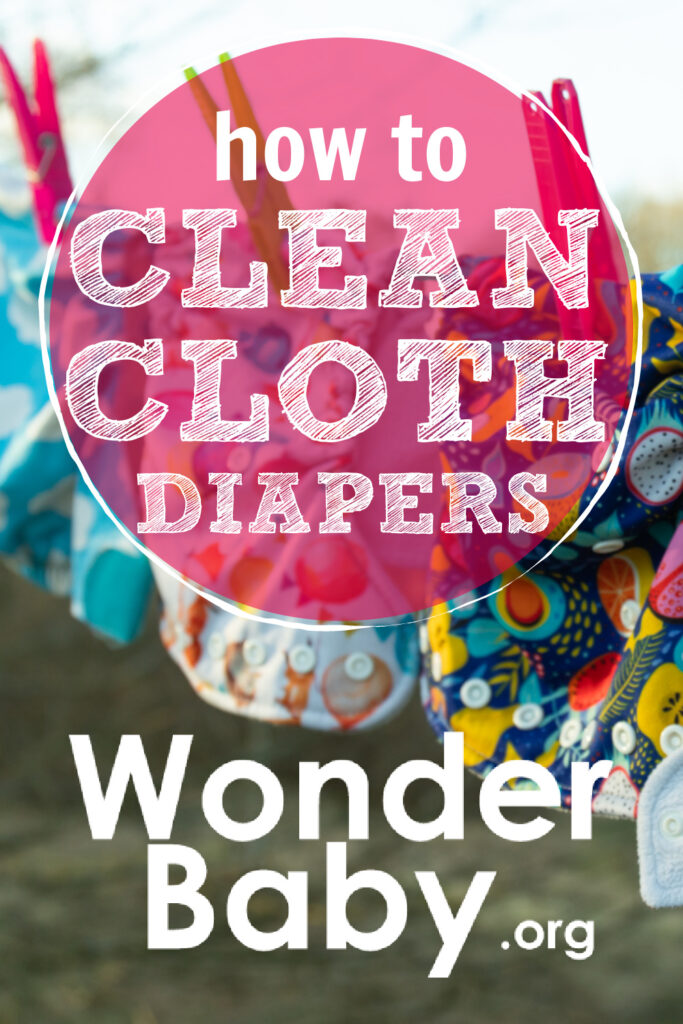
Related Posts
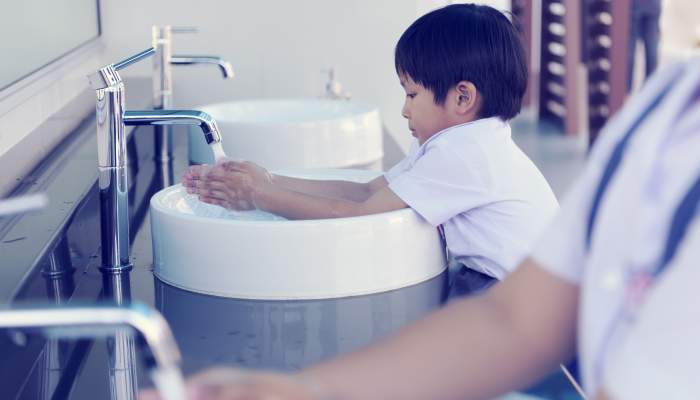
IEPs, Potty Training
7 Sample Toileting IEP Goals
Toileting IEP goals should address the specific needs and abilities of each child. Be flexible and patient as your child works on their toileting skills.
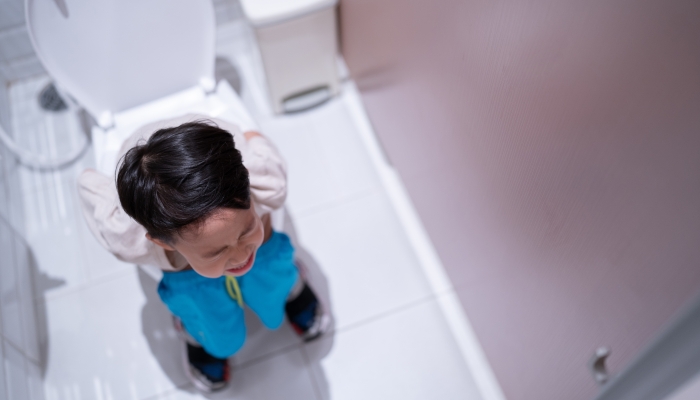
Potty Training
How To Deal With Constipation When Potty Training
Constipation is common amongst children of potty training age. Many children suffer from potty training constipation, but there are things you can do to help.

Potty Training
5 Potty Training Games To Make Potty Training Fun
Learning to use the toilet doesn’t have to feel like hard work. There are lots of potty training games you can play with your toddler to make learning fun.